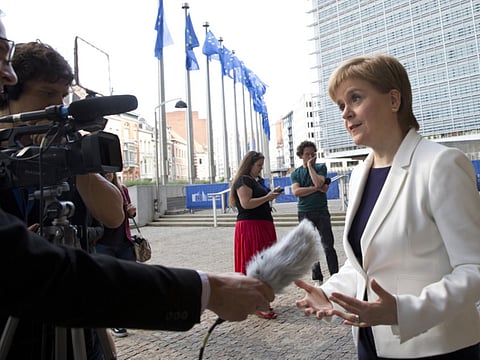UK: A union under pressure after Scottish elections 2021
Victory of Scottish nationalists in UK elections puts pressure on a strained relationship

Last Thursday, voters in the United Kingdom went to the polls to elect regional parliaments in Scotland and Wales, and a series of councils and directly elected mayors and police commissioners in England.
Some of the elections had been postponed since last year, but the results from England largely represented a stamp of approval for the government of Prime Minister Boris Johnson with debutant leader Sir Kier Starmer failing to make a positive impact on English voters. That’s the good news.
The bad news is that in Scotland, voters returned a majority of Scottish nationalists to the regional parliament at Holyrood in Edinburgh. The Scottish Nationalist Party (SNP), led by First Minister Nicola Sturgeon, has now been elected to govern Scottish affairs for the fourth successive election.
Although the SNP failed by one seat to win an overall majority in the new parliament, it can rely on the support of the Green Party’s eight representatives who also support the national of 5 million becoming independent.
Sturgeon has already made the case that the election results, where a majority of Scots cast ballots for independence-supporting parties, effectively means she now has a mandate to seek a referendum on Scottish sovereignty.
And she has indicated that her government will be preparing legislation to allow for that referendum to happen. It won’t happen this year, given that Scotland and the rest of the UK is recovering from coronavirus — but it will occur within the five-year lifespan of this parliament.
The results pose a significant challenge for Johnson and represent an existential threat to the union that binds together the four nations of the UK for the past three centuries.
Johnson has said he won’t allow a second referendum on independence — one was held seven years ago and voters decided then by 54 to 46 per cent to remain in the UK.
But by refusing one, he is open to the SNP charge that London is ignoring the wishes of Scottish voters, is undermining the devolutionary powers that give parliaments in Scotland, Wales and Northern Ireland powers to manage their domestic affairs, and shows that London is wholly out of touch with Scotland.
The PM says that the UK needs to focus on recovering from coronavirus and that the independence debate detracts from that crucial task. But there is an inevitable confrontation coming, one that will most likely be played out in a constitutional case of unprecedented significance in the UK law courts. But the issue of Scottish independence is not going away.








